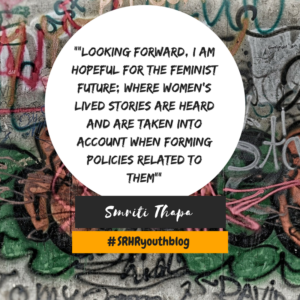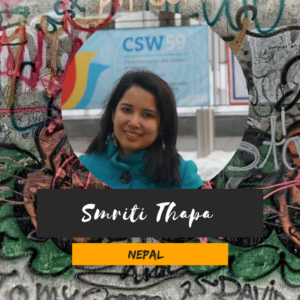#SRHRyouthblog: Looking back, Looking forward by Smriti Thapa
I was named Smriti (meaning memory) by my mom, in memory of her five year old son who she lost to illness. During my childhood, I was often reminded of how my mother had almost died giving birth to me in an obstructed and prolonged labor. My mother had also been subject to inhumane and degrading treatment by health care providers after being verbally abused and slapped for not pushing enough. The total lack of respectful maternity care made me realize the importance of compassionate care, and so, I pursued an undergraduate degree in nursing.
At the beginning, my initial knowledge of reproductive rights was limited and so, my efforts were focused on maternal health from a medical perspective. Later on, my passion for the sector led me to pursue further studies in women’s health and development. During this time I also began volunteering as the ‘Young Midwifes Coordinator’ in The Midwifery Society of Nepal. It was here where my understanding of reproductive rights started to develop. Alongside my fellow young nurses and midwives we raised our voices against obstetric violence and promoted the agenda of respectful women’s healthcare through a series of seminars, dialogues and training sessions within the medical and nursing fraternity.
In my first year of grad school, I received an opportunity from Asia Safe Abortion Partnership (ASAP) to attend the Youth Advocacy Institute on Safe Abortion. This was the true impetus for my SRHR activism. I returned excited, motivated and ready to share the tremendous learning and experiences I had had in those life-changing three days. My experience at the institute motivated me to expand my vision of women’s health through the lens of gender and other socio, economic and political contexts.
Meanwhile, I received another opportunity to attend an Advocacy in Practice training run by The International Women’s Health Coalition (IWHC) to learn more on advocacy at UN. Then again, In 2014, I got another amazing opportunity to facilitate the engagement of young women in Beijing20+. The goal was to strengthen the country’s position on SRHR for the 59th Session of the Commission of Status of Women (CSW) through a IWHC project called “Young Women For Change”. We conducted the first young women’s caucus in Nepal, where 60 young women working in the field of SRHR provided their expert opinions. We developed a position paper which highlighted the needs of young women followed by a strategic meeting with the government and members of civil society who intended to attend the CSW that year.
Nepal’s country statement that year reflected its commitments in international arenas to advance the SRHR of women and girls – a proud moment for all. However, upon return when the draft constitution was released following federalism, there was backlash against the SRHR commitments – the very commitments our caucus had influenced. Through collective activism we were able to preserve the SRHR advancements made in our constitution, our statement on the 59th session served as an important tool for influencing parliamentarians. The entire process has been the most beautiful moment in my SRHR activism journey to date. It has made me realize the true importance of activism and it has also inspired me to cofound a young feminist organization called ‘Young Women for Change’ that promotes gender equality and young women’s leadership under the principles of the Beijing platform of action.
In 2015, I cofounded an alumni network called Youth Champions Advocacy Nepal (Youth CAN) along with my fellow youth champions. Youth CAN promotes youth leadership through capacity development, network and movement building and SRHR campaigning both online and offline. Youth CAN is the only youth led advocacy network in the ‘Reproductive Health Right Working Group’ (RHRWG), an alliance of organizations working on SRHR at national level with a special focus in advancing access to safe abortion services as human rights.
Some challenges I have faced as a youth SRHR activist so far, has been navigating intergenerational attitudes. Also, gaining the acknowledgment of being an expert whilst being a youth activist has not been easy. Finally, the stigma that stems from the patriarchal system is another barrier but despite the challenges, being an advocate for issues and rights which affect your own body is incredibly gratifying. Over the course of my youth SRHR activist career my personal and professional growth has been tremendous. Moreover, it has given me new values that are based upon equality, respect and compassion for all. 
Looking forward, I am hopeful for the feminist future; where women’s lived stories are heard and are taken into account when forming policies related to them; where our diversity is cherished and revered in all its forms; and where universal access to SRHR are lived realities for all and not just developmental agendas.
Follow on Smriti on Twitter!
Do you like what we do and want to support our work? Donate here on December 13th and your donation will be matched!

